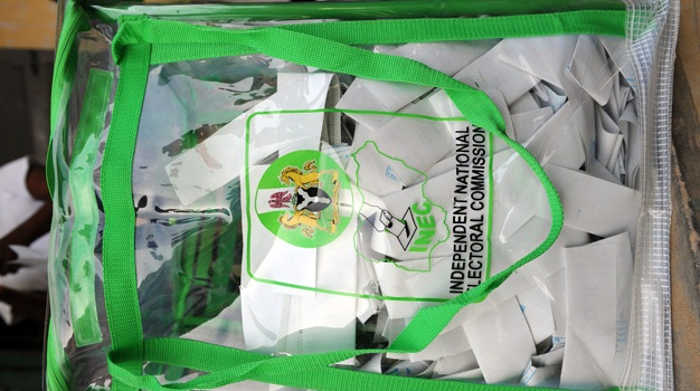
A ballot box filled with ballot is pictured before being counted by the Independent National Electoral Commission (INEC) at a polling station in Yenagoa, in Nigeria's Bayelsa State, on April 16, 2011, after Nigeria's crucial presidential election and a bid by Africa's most populous country to hold its cleanest polls for head of state since the end of military rule. AFP PHOTO / PIUS UTOMI EKPEI
By JOHN NWOKOCHA
The Independent National Electoral Commission (INEC), Thursday, May 28, recorded a landslide victory in a suit determined by the Federal High Court in Abuja. The suit filed by the erstwhile National Unity Party (NUP) challenged the constitutional power of INEC to deregister political parties.
The NUP is one of the 74 political parties that INEC deregistered in February this year on the ground that the parties failed to meet some requirements among which is their inability win any position in Presidential, Federal and State Legislative, Governorship and FCT Council elections as required by the 1999 Constitution as amended. The commission stated unreservedly: the 74 parties did not satisfy the requirements of the Fourth Alteration to the Constitutional Electoral Act 2010 (as amended).
Furthermore, the commission explained that it carried out an assessment of political parties to determine their compliance with the requirements for registration.
Consequently, the commission was able to determine the performance of political parties in the elections.
It would be recalled that controversy had trailed the deregistration of the 74 political parties with some of the affected parties questioning the power of the commission to act decisively. But the national chairman of INEC, Professor Mahmood Yakubu said the commission’s action was in sync with provisions of 1999 constitution, with particular reference to section 225 (A) of the constitution. Further justification for the deregistration according to the commission is the parties performed abysmally in all the general elections conducted by it such that they could not win any position. And this unarguably would mean that these parties did not exist at all in the strict sense of it.
So on February 5, the commission declared as follows: “the deregistration followed the poor performance of the parties in the 2019 general elections and court-ordered re-run elections arising from litigations” adding that the action was in preparation for the coming 2023 general elections.
The commission listed the deregistered parties to include: UDP,UPC, UPN, UP, UPP, WTPN, YDP, YES, YP, SPN, SNP, SNC, RP, RBNP,RAP,PT,PPP,PPN,PPC,PPA, PDM,PDC,PCP, NUP, NPM, NPC, NIP,NCP, NFD, NEPP,NDLP, NDCP, NCP,NCMP,NAC, MPN,MMN,MDP, MAJA, LPN, LM, KP, ID, HDP,CPN, GDPN,FJP, FDP, DPP,DPC, DA,COP, CNP, CC, CAP, BNPP, AUN, ASD, APN,APDA,APA,ANRP, ANP, ANN, ANDP, AGAP, AGA, AD, AAP,ABP,ACD and ACPN.
With this development only 18 parties scaled the requirement hurdles for registration. In short, the 18 parties have fulfilled the requirements for an existence based on Section 225A of the 1999 Constitution (as amended).
The political parties that escaped the INEC hammer are: Accord, (A); Action Alliance, (AA); African Action Congress (AAC), African Democratic Congress (ADC), African Democratic Party (ADP) and All Progressive Congress (APC), All Progressive Grand Alliance (APG); Allied Peoples Movement (APM), Labour Party (LP), National Rescue Movement (NNPP), National Rescue Movement (NRM), Peoples Democratic Party (PDP), Peoples Redemption Party (PRP), Social Democratic Party (SDP), Young Progressive Party (YPP), Zenith Labour Party (ZLP) and Boot Party.
Amid the shock over the deregistration, the Actions People’s Party (APP) swiftly filed a suit and obtained a court order restraining INEC from deregistering it and this commenced the controversies that have raged between the electoral commission and the 74 parties.
The deregistered parties would do everything to get them back in the system including whipping up public sympathy. But elections stakeholders think their argument is opaque. Although in participatory democracy large numbers of registered political parties is a blessing as it gives the electorate choices during elections, it not in the long run produce the expected vibrancy that comes with multiparty system. Instead what was seen was largely the flip side of mixed multitudes, confusion and drawback to a fledgling democracy. Did they add any values? Many existed on their call cards, mail boxes and portfolios. Their operations leave much to be desired. If you add the mercantile motive behind some them it would become clear why discerning stakeholders abinitio called for pruning of political parties. Unfortunately, voters participation which is an important element of multiparty system declined.
Following the order restraining INEC from deregistering the 74 parties obtained by APP, NUP also filed a suit seeking similar order of the court. Fortunately, for the commission, the court affirmed that INEC has constitutional power Commission to deregister political parties which failed to comply with the provisions of the law particularly Section 225 A of the 1999 Constitution as amended. Justice Taiwo Taiwo of the Abuja division of the Federal High Court held that he reasons given by the commission were valid in conformity with the law , sacrosanct and could not be affected by the fact of anticipated Local govt elections by some states which dates were not fixed, certain or even ascertainable.
In the landmark judgment Justice Taiwo held that the party failed to show that the exercise of the commission’s powers to deregister the party was at variance with the law and also ultra vires its powers.
By this same token, only 18 political parties will be participating in the Edo and Ondo State governorship elections scheduled to hold on September 19, 2020 and October 10, 2020 respectively.
Speaking on the development, chieftain of one of the deregistered parties, Pastor Orji Chekwas Orji said “until the Federal High Court verdict is set aside, the parties remain deregistered and will not participate in the nation’s political process”.
It is pertinent to note that the Federal High Court’s ruling on the matter is a milestone for the commission under the leadership of the current national chairman, Professor Yakubu.
The commission has been faced with not a few litigations in recent time many of which are suits filed by political parties on matters ranging from electoral processes, conduct during general elections to elections results.
Legal experts agree that the ruling is unlikely to be upturned by another court of of coordinate jurisdiction they argue that any judge of High court would need to find a marked difference before it can turn aside the earlier judgment thereby dimming the hope of any of the affected74 parties regaining their legal right to exit. From the look of it, this is a tremendous success for the commission in its legal tussles.



